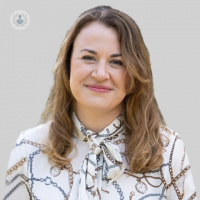Paediatric sleep apnoea: FAQ
Written by:Paediatric sleep apnoea is a disorder where a child's breathing is repeatedly interrupted during sleep, often due to blocked airways, leading to disrupted sleep and potential health issues. Here to explain more about the condition is leading consultant adult & paediatric ENT Miss Victoria Alexander, who discusses how it can affect a child’s development and treatment options.

What is paediatric sleep apnoea?
When we sleep, the muscles supporting our breathing in and out through our mouths, throat, wind pip relax. This affects the size of the airways making them, in essence, narrower and therefore harder for air to move through each area into our lungs. The space of the airways is also affected by the shape of a child’s jaw, facial structures and if a child is overweight.
Having large tonsils and large adenoids (similar tissue to the tonsils that sit at the back of the nose) will also reduce the space to breathe through. This can all result in obstructive breathing at night, when this is severe the amount of oxygen levels in the blood can drop intermittently or persistently, also known as sleep apnoea.
What are the principal signs and symptoms of paediatric sleep apnoea?
Snoring associated with pauses in breath or grunting with positional change or persistent waking can be observed whilst a child is sleeping. This happens regardless of whether a child has a cold or viral infection. Increased bed wetting or night terrors can also be symptoms of paediatric sleep apnoea.
As a result of this, a child’s behaviour may change. They may want to sleep a lot lack concentration, or on the contrary, they can become very hyperactive. In severe cases, obstructive sleep apnoea can affect growth. You may find your child is struggling to put on weight, and that their height doesn’t seem to be increasing as it should compared to their peers.
What are some triggers of paediatric sleep apnoea?
Paediatric sleep apnoea is a condition which doesn’t tend to get triggered.
Why is paediatric sleep apnoea a concern?
OSA is a concern as it can affect growth and weight gain, cause poor school performance, decrease concentration levels and cause aggressive behaviour. If a child has severe obstructive sleep apnoea, it can potentially have a long-term impact on their academic performance, as well as their neurological and psychological development.
What are the treatment options for paediatric sleep apnoea?
Treatment options depend on the cause. If a child has large tonsils and adenoids, they can be trimmed down via an adenotonsillectomy, which can improve the symptoms of sleep apnoea. If a child is overweight, we would advise weight loss. An adenotonsillectomy may address facial structural concerns, but the child may also benefit from an assessment from a maxillary facial surgeon.
How does sleep apnoea affect a child's behaviour and development?
Sleep apnoea can cause aggression, hyperactivity, excessive tiredness, lack of concentration and poor academic performance.
If your child is suffering from sleep apnoea and you would like to book a consultation with Ms Alexander, do not hesitate to do so by visiting her Top Doctors profile today


